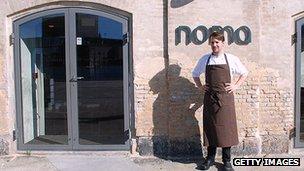Eating Christmas trees at the 'world's best restaurant'
- Published
Rene Redzepi gives Stephen Sackur a tour of his houseboat food lab where food combinations are experimented with to create new tastes
Rene Redzepi is the Willy Wonka of food science, conducting gastronomic experiments so popular that customers fly round the world to eat at his £150-a-head Copenhagen restaurant.
If you have just thrown out your Christmas tree, may I make a suggestion? Next year don't dump it, burn it or shred it - just eat it.
Believe me, the needles from your average Christmas fir can be delicious.
How do I know? Well I am just back from the most extraordinary gastronomic journey of my life - the citrusy tang of freeze dried Christmas tree was just one of the surprises along the way.
My guide was Rene Redzepi, a bearded 34-year-old chef with intense brown eyes whose Copenhagen restaurant Noma is currently regarded by food critics as the world's finest.
Actually, to his worldwide legion of gastronomic disciples, labelling Redzepi as a cook is akin to defining Michelangelo as a jobbing painter and decorator.
From humble beginnings - he left school at 15 with no qualifications - Redzepi has developed a philosophy of food which embraces science, nature and art.
I met him in the teeth of a biting wind on a bleak quayside in the Danish capital. Rene's restaurant occupies the end of an old warehouse overlooking the water - but that was not our first destination.
Instead he took me to a sturdy houseboat tied up at the jetty. "Welcome to the Nordic Food Lab," he said with a smile.
If Willy Wonka had been Scandinavian, this is what his chocolate factory might have looked like.

Noma has featured among the world's top 10 restaurants for the last four years
Pine floor, white walls, clean lines, and on every available surface outlandish food experiments being conducted by white-coated technicians.
In one corner, an array of flasks bubbling with brown liquid. Nearby a centrifuge whirring. It would not have looked out of place in a nuclear lab.
"We're trying to break down peas to get at the natural pea fat. Maybe we can produce pea butter," Rene explained.
I was invited to taste a murky liquid from a small glass pipette. It tasted a lot like soy sauce. Apparently it was extracted from local seaweed.
This is what chef Redzepi calls "the science of deliciousness".
Live ants served
From freeze dried pine needles to fermented mackerel, 21st Century chemistry is being harnessed to the age-old quest for new flavours.
The raw materials are local - either foraged from the sea, the shore or the forest - or grown by a select band of trusted organic producers.
It is that commitment to authentic Nordic ingredients that defines Redzepi. No olive oil, no garlic, no reliance on air transport and the freezer to subvert the rhythm of the seasons.
This means that eating at this time of year is truly a taste of Nordic winter - bitter leaves, mushrooms, nuts, berries, and moss are in, but sun-dried tomatoes are most definitely out.
I confess I was nervous before taking my seat in the compact dining room. Foodies think nothing of flying half way round the world for a table here - reservations have to be made months in advance.
And there is something quite disconcerting about being one of 40 diners in a restaurant staffed by 70. Frankly even if a dish tastes disgusting, the pressure is on to empty your plate.
To my relief, the two dishes I had been most worried about - the live wriggling prawn and the live local ants (apparently they release a delicious lemon grassy acid taste when they expire in your mouth) were off the menu.
Many of the 16 courses were no bigger than a chicken nugget.

Feeling peckish?
I will not bore you with every detail, but the highlights included - snail wrapped in nasturtium flowers, quail's egg served on a bed of smoking hay, mussels served in an edible seaweed shell, fried moss dusted with porcini shavings, and for pudding, an ice cream served in luminous green dill sauce.
Was it delicious? Well, as the curate said of his egg, it was in parts. But even when it was not, the experience was extraordinary.
Rene's international team of chefs served many of the dishes themselves. They explained the provenance of the food, the intricate preparation and the quest for perfect presentation.
They were neither fussy, nor pretentious - my heart warmed to a young Irish sous chef who whispered of his local cheese dish "You'll love the cracker because it tastes just like a Ritz".
Given the cost - dinner starts at £150 a head - and the long waiting list for a reservation, Noma is an experience for the lucky few.
But Rene Redzepi's obsession, serving food that in his words gives you "a sense of time and place to your very bones" is surely relevant to us all.
Come to think of it, I have got a fir tree in the garden. I have got a lawn full of moss and some very strange fungi growing in my borders. Lunch, anyone?
Stephen Sackur spoke to Rene Redzepi for a recent edition of BBC's Hardtalk, available online (UK only) at the above link.
How to listen to From Our Own Correspondent:
BBC Radio 4: A 30-minute programme on Saturdays, 1130.
Second 30-minute programme on Thursdays, 1100 (some weeks only).
Listen online or download the podcast
BBC World Service:
Hear daily 10-minute editions Monday to Friday, repeated through the day, also available to listen online.
Read more or explore the archive, external at the programme website, external.
Stephen Sackur also presents HARDtalk, external broadcast on BBC World News and the BBC News Channel.